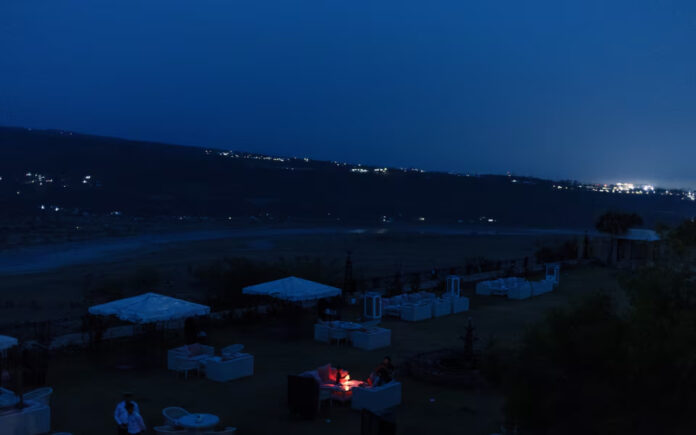Srinagar: Tensions between India and Pakistan escalated sharply on Friday, with both nations accusing each other of carrying out fresh military assaults involving drones and artillery fire. This marks the third consecutive day of the most severe fighting between the two nuclear-armed neighbors since the 1999 Kargil conflict.
The renewed clashes began after India launched strikes on multiple sites in Pakistan, which it described as “terrorist camps,” in retaliation for a recent attack on Hindu pilgrims in Indian-administered Kashmir. Pakistan has denied any involvement in that incident, but the exchange of fire has since intensified, including the deployment of drones and missiles across contested airspace.
Authorities report that nearly four dozen people have been killed in the violence so far, and villages along the border in both countries have emptied as residents flee. Cities are grappling with blackouts, air raid sirens, and panic buying of essential supplies. The Indian Premier League (IPL), the country’s flagship T20 cricket tournament, has been suspended after a match was abruptly halted and floodlights switched off on Thursday.
For the first time since the 1971 full-scale war, Indian forces have reportedly targeted locations deep within Pakistan’s mainland provinces, outside of the disputed Kashmir region.
India’s army stated that Pakistani forces committed “numerous ceasefire violations” along the Line of Control in Kashmir.
“The drone attacks were effectively repulsed and befitting reply was given to the CFVs (ceasefire violations),” the army said, adding that all “nefarious designs” would be countered with “force.”
In response, Pakistan’s Information Minister Attaullah Tarar dismissed the claims as “baseless and misleading”, asserting that Pakistan had not carried out any offensive actions in Indian Kashmir or beyond the border.
Officials in Pakistan-administered Kashmir reported that five civilians, including an infant, were killed and 29 others injured in overnight shelling early Friday.
India’s defence ministry has not yet issued a statement in response.
Sustained Shelling, Sirens, and Evacuations
On Thursday night, Indian authorities said a “major infiltration bid” was thwarted in Kashmir’s Samba region. Heavy shelling continued in the Uri area into Friday. A local security official, who requested anonymity, said:
“Several houses caught fire and were damaged in the shelling in the Uri sector… one woman was killed and three people were injured in overnight shelling.”
In the border city of Amritsar, home to the revered Golden Temple, sirens wailed for over two hours, prompting authorities to advise residents to stay indoors. Many tourists evacuated the city by road after the airport was closed.
“We really wanted to stay but the loud sounds, sirens, and blackouts are giving us sleepless nights. Our families back home are worried for us so we have booked a cab and are leaving,” said a British national who did not wish to be identified.
Other sensitive regions also took emergency precautions. In Gujarat’s Bhuj area, tourist buses were placed on standby for evacuations. In Rajasthan’s Bikaner region, schools and coaching centers were closed, and residents living near the border were advised to relocate to government-arranged shelters or relatives’ homes.
Also Read | India Halts IPL Tournament as Military Clashes with Pakistan Intensify
India’s Directorate General of Shipping also ordered heightened security measures at all ports, terminals, and shipyards in light of “growing concerns regarding potential threats.”
In Jammu city, where blasts were reported overnight, Ansab, a student at the Sher-e-Kashmir University of Agriculture, Science and Technology, described the intensity of the explosions:
“For two to three minutes it became very loud, windows started shaking as if they will break,” she said. She added that the air later appeared “smoggy” due to a mixture of smoke and fog.
Global Concerns and Diplomatic Efforts
The rising hostilities have triggered urgent appeals for de-escalation from world powers including the United States and China. U.S. Vice President JD Vance reiterated the call on Thursday:
“We want this thing to de-escalate as quickly as possible. We can’t control these countries, though,” he said during an appearance on Fox News’ The Story with Martha MacCallum.
Also Read | Cyber Attacker Who Leaked Star Health Data Says He Mailed Bullets to CEO, CFO
Saudi Minister of State for Foreign Affairs, Adel Al-Jubeir, who visited India on Thursday and met with Indian Foreign Minister Subrahmanyam Jaishankar, is expected in Pakistan for talks on Friday.
Jaishankar said he “shared India’s perspectives on firmly countering terrorism” during the meeting.
Meanwhile, Pakistan’s Defence Minister Khawaja Muhammad Asif informed parliament that Islamabad was in “daily” communication with Saudi Arabia, Qatar, and China in efforts to defuse the crisis.
Since their independence from British colonial rule in 1947, Hindu-majority India and Muslim-majority Pakistan have shared a tumultuous relationship. The Kashmir region, predominantly Muslim, has remained the focal point of hostility, with the two countries fighting two of their three wars over the territory.



